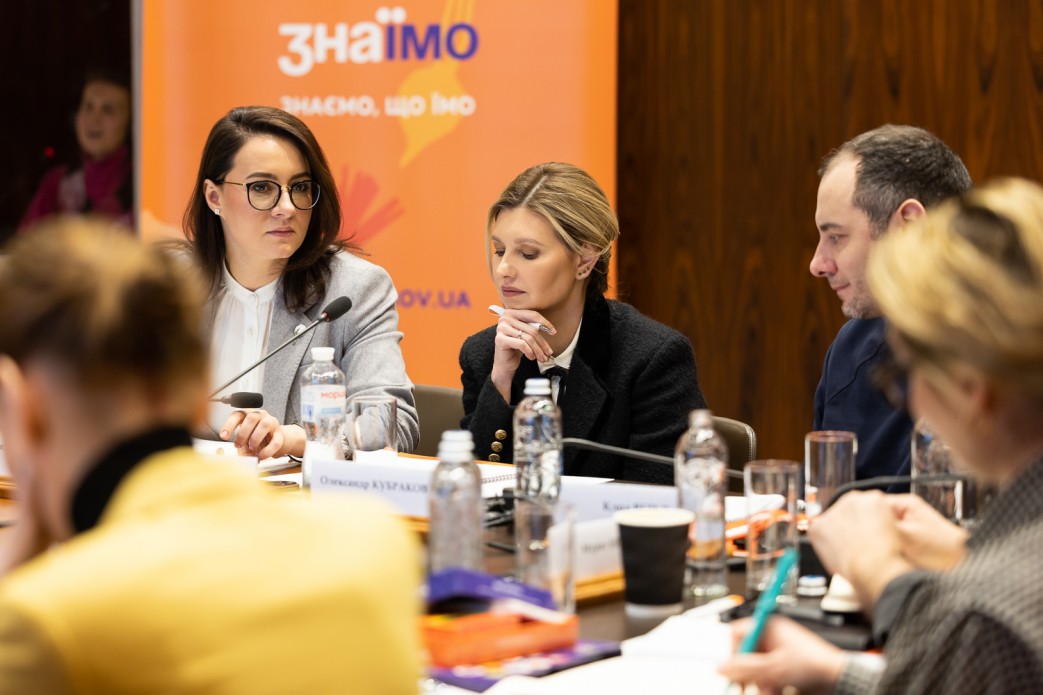First Lady Olena Zelenska took part in a working meeting entitled: "School Food Reform: Priority Areas of Development in the Conditions of War and Post-War Recovery of Ukraine." The meeting was held to discuss the results of the recent strategic session and the next stages of the reform, in particular, the presentation of the draft strategy for reforming the school food system for 2023-2027 and consideration of priority projects for the current year.

The event was attended by: Ambassador Extraordinary and Plenipotentiary of the Swiss Confederation to Ukraine Claude Wild, UNICEF Representative in Ukraine Murat Sahin, First Deputy Prime Minister, Minister of Economy of Ukraine Yulia Svyrydenko, Deputy Prime Minister for the Reconstruction of Ukraine, Minister of Communities, Territories and Infrastructure Development Oleksandr Kubrakov, Minister of Health Viktor Liashko, Minister of Agrarian Policy and Food Mykola Solsky, Minister of Education and Science Serhiy Shkarlet, Head of the Antimonopoly Committee of Ukraine Olha Pischanska, representatives of the Ministry of Communities, Territories and Infrastructure Development of Ukraine, State Service of Ukraine on Food Safety and Consumer Protection, Antimonopoly Committee, SOE Prozorro, and the Swiss-Ukrainian DECIDE project.
"War should not be an excuse. After all, despite the war, children study, and teachers work – sometimes in extreme conditions. It's a distinct form of heroism. Therefore, it's time for the reform to return to support the educational front. In addition, we made too much effort in the past to not bring the case to the end now," the President's wife said, opening the meeting.
The strategy for reforming the school food system for 2023-2027, which was discussed by the participants, includes five main areas:
• Development of personnel potential.
• Restoration and modernization of food blocks in educational institutions.
• Financial support of territorial communities in providing food for pupils/students of educational institutions.
• Healthy food in educational institutions (the implementation of new standards and menus).
• Promotion of a healthy food culture during the war.
An analysis of the impact of full-scale armed aggression on the school food system was presented at the meeting. According to the state scientific institution "Institute of Educational Analytics," in the 2022/2023 academic year, 12,926 general secondary education institutions operate. Of these, 8,726, or 67.5%, operate food units. Almost 8,000 schools (61%) took part in the survey. Out of them, in 301 institutions, the premises of the food unit were damaged or destroyed in hostilities; 232 institutions lost their equipment due to hostilities and/or occupation.

Among the biggest problems of educational institutions are outdated or insufficient equipment, dishes and furniture, air alerts and power outages, lack of premises and an urgent need for repair work, insufficient funding, in particular, to meet food standards, as well as the impossibility of organizing food in conditions of martial law.
"Currently, almost 9,000 schools continue the face-to-face and mixed educational process, and therefore they must not only provide our children with healthy food but also cultivate the habit of proper nutrition. We are trying to adapt menus and technological cooking processes in schools to the challenges of wartime. Despite the military aggression of the Russian Federation, the active development of personnel potential continues, training programs and trainings for cooks are being implemented. The Znaimo portal is being actively developed. The launch of a kitchen factory in Bucha is planned. We do not stand still and constantly work to ensure a good, and most importantly, healthy and safe future for our children," Shkarlet said, delivering his speech at the meeting.
After the analysis and discussions, the school nutrition reform team shaped the following vision for 2027: diverse, balanced and high-quality nutrition in educational institutions; taking into account the nutritional needs of vulnerable segments of the population (student families, internally displaced persons, etc.) and forming an understanding of the dependence of health and psychological state on quality nutrition in society.
Four main strategic goals have been identified:
1. Customers must obtain sufficient financial resources for procurement and carry them out easily and efficiently.
2. In the restored and modernized food units of educational institutions, the latest technological processes should be used, energy efficiency indicators should be improved, and the HACCP system requirements should be observed.
3. Education management bodies in territorial communities and educational institutions should form a sufficient staff of qualified employees who organize high-quality and safe food and promote the development of healthy eating habits among students.
4. Ukrainians should come to a conscious choice of healthy food.

As part of developing personnel potential, an initiative to prepare trainers to improve the qualifications of cooks in school canteens was implemented in 2022. Some 87 employees of the vocational school took part in the project to prepare trainers who in the future will be able to improve the qualifications of school canteen cooks. As a result, the educational training program for school nutrition reform trainers was developed.
This year, the "Cooking Hubs" project was launched to create three centers for professional development and improvement of school canteen cooks based on vocational education institutions in Poltava, Ternopil, and Sumy regions; the training of 60 trainers is being organized to conduct training courses for school canteen cooks in the pilot regions, and a set of educational and methodical materials is being developed for food unit workers. The partners of this project are the National Foodservice Association, the CultFood team headed by Yevhen Klopotenko, Ministry of Education and Science, and the Embassy of Switzerland.
The plans include the scaling of cooking hubs throughout the country, training more than 500 trainers, updating the set of educational and methodical materials for workers of food units, pedagogical workers by "cook," "school food cook" professions. Motivated and professional doctors, nutritionists, and workers of food units should work in educational institutions.
The President's wife thanked the participants of the meeting and said this year we need to work twice as hard on the school food reform to compensate for the year stolen by the war.
"During this year, we learned to care more about each other and take even more responsibility for those around us. It would be wonderful if educational institutions would become – and are already becoming – centers and examples of such care," Zelenska said.





